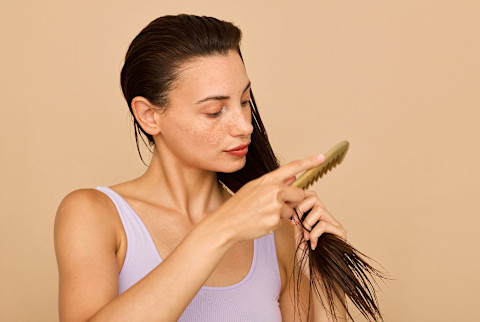I'm A Plastic Surgeon: This Is What I Recommend If You Have Thinning Hair

Anthony Youn, M.D., may be a board-certified plastic surgeon, but he prefers long-term recommendations for skin longevity (hence, the holistic in his professional title) over "quick" fixes under the knife. In fact, it's his personal goal to keep patients out of the operating room: He does perform surgery on a select bucket of patients, sure, but only as a last resort. Until then, he likes to stick to proactive measures and less-invasive treatments—so, naturally, his recommendations for thinning hair align with this holistic philosophy.
"There are a lot of causes of hair loss, and because of that, there are also a lot of great treatments for it—hair transplants being the absolute last resort," he says on the mindbodygreen podcast. Specifically, Youn mentions a trifecta of go-to tips for treating thinning hair:
Targeted supplements.
"There are many studies that show supplementation can help," says Youn. Take this small study on biotin, for example: Women with thinning hair reported significant regrowth when supplementing with biotin, compared to those taking a placebo. In addition to the essential B vitamin, Youn touts iron supplements (without proper iron intake, hair follicles do not function properly) as well as vitamin D.
"We know that vitamin D is very important for the hair follicle and therefore hair growth," seconds board-certified dermatologist and hair care expert Raechele Cochran Gathers, M.D., on an episode of Clean Beauty School. "In fact, vitamin D is one of the fat-soluble vitamins needed for maintaining and creating functioning hair follicles." (Find our favorite vitamin D supplements here).
Supplement routines are entirely personal, though, so please do speak with your doctor before selecting which capsules to take—a professional can identify the best route for your hair growth goals. (And see here for our full rundown on hair vitamins, if you're curious.)
Low-light laser therapy.
Another treatment Youn loves for thinning hair? Low-light laser therapy. While we need more research, the current data seems encouraging: Specifically, one study found that women who received red light therapy at 650 nm every other day for 17 weeks experienced a 51% increase in hair density1, and another research review touted red light therapy as safe and effective for promoting hair growth2 in both men and women.
"Low-light laser therapy is basically like the laser of a laser pointer," Youn explains. "It doesn't create any heat. You can have it pointing at your skin for hours, and you're not going to get a burn." The theory, he continues, is that these low-light lasers can create changes in your follicle's growth phase, which can help to thicken and grow hair.
"There are baseball caps you can wear—on the undersurface of the cap, there are dozens or so low-light lasers that can affect the scalp and cause the hair to go into its growth phase," he adds. Check out this FDA-cleared option—it costs a pretty penny, but most high-quality options hover around this price point.
Rosemary oil.
On to the topicals. "There's actually something very natural that people can use: a topical rosemary oil," Youn says. In fact, a 2015 randomized comparative trial found that rosemary essential oil was just as effective3 as minoxidil (the active ingredient in many commercial hair-growth products) for reversing hair loss caused by androgens—also known as male- or female-pattern baldness—after six months.
"However, a significant difference between the two is that [minoxidil] had a higher rate of itching and discomfort of the skin, whereas rosemary oil did not," Youn adds regarding the study. "So that is definitely a very reasonable option for people who want to stay natural and have some thinning hair issues."
Although, you should never apply potent essential oils directly onto the scalp—these participants diluted the solution in a carrier oil base, and so should you if you ever test the method. (Or try this DIY rosemary water rinse.)
The takeaway.
If you're dealing with increased shedding, it ultimately takes time and patience to figure out the best treatment for you. That said, you might not see instant success with Youn's go-to tips, and that's OK—there are plenty of other triggers (and treatments) for hair loss, and it's always a good idea to consult a professional about your personal hair growth journey.

